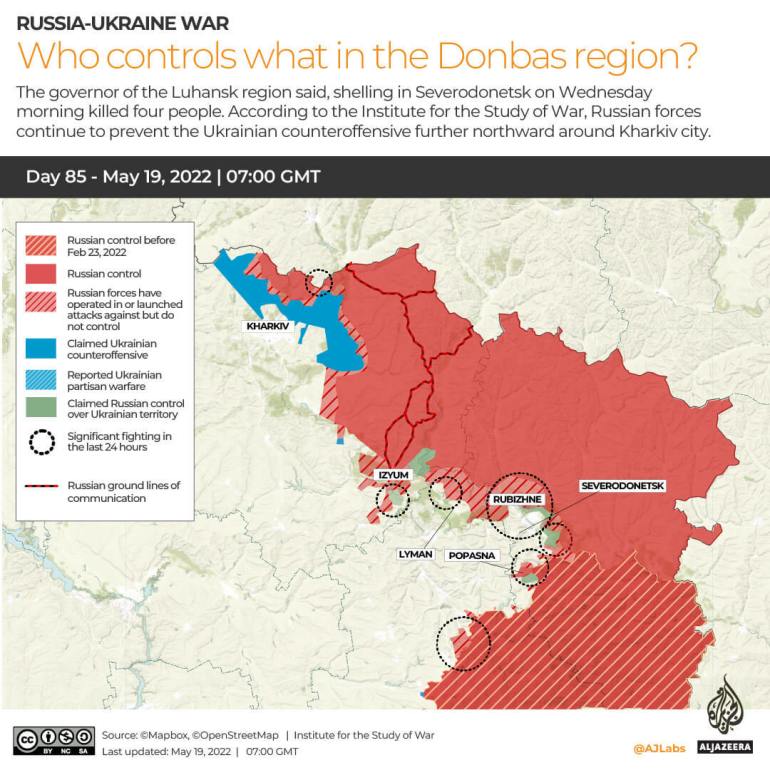[ad_1]
US president says massive assistance package will help Ukraine ‘defend democracy’ amid Russia’s ongoing invasion.
- US President Joe Biden applauds Congress for approving a $40bn aid package for Ukraine.
- The Biden administration announces an additional $100m in security assistance to Kyiv, including artillery, radars and other equipment.
- Ex-Russian President Dmitry Medvedev says the West should not expect Russia to continue food supplies if it slaps Moscow with devastating penalties.
- Turkey’s President Recep Tayyip Erdogan says “no” to Sweden and Finland joining NATO, as Turkish officials emphasized Ankara’s security concerns.

Here are all the latest updates:
Russia’s former president denounces ‘insane’ sanctions
Former Russian President Dmitry Medvedev has said the West should not expect Russia to continue food supplies if it slaps Moscow with devastating punishments over the war.
“Our country is ready to fulfill its obligations in full. But it also expects assistance from trading partners, including on international platforms,” Medvedev, who now serves as deputy chairman of Russia’s Security Council, said on messaging app Telegram.
“Otherwise, there’s no logic: on the one hand, insane sanctions are being imposed against us, on the other hand, they are demanding food supplies. Things don’t work like that, we’re not idiots,” he said.
His comments come as world leaders including UN Secretary-General Antonio Guterres have raised serious concerns over global food supplies, warning that curbs on grain exports from Ukraine ports could lead to shortages and even famine.
Washington announces additional $100m in military assistance to Kyiv
The Biden administration has announced an additional $100m in weapons and other military equipment for Ukraine.
Biden said in a statement that the aid includes additional artillery, radars, and other equipment.
“This brings total US military assistance to Ukraine to approximately $3.9 billion in arms and equipment since Russia launched its brutal and unprovoked full-scale invasion of Ukraine on February 24,” Secretary of State Antony Blinken also said.
NATO membership for Sweden, Finland will ‘strengthen collective security’: Biden
NATO’s collective security will be strengthened by the membership of Sweden and Finland, Biden has said, after meeting with the leaders of the two Nordic nations at the White House.
In a statement after the discussions, the White House said the US president “warmly welcomed [Sweden and Finland’s] applications for NATO membership, which will strengthen our collective security”.
“At this historic moment for both Finland and Sweden, the President underscored his commitment to support both countries as they seek formal NATO accession, including by working with NATO Allies and Congress to welcome them into the Alliance as quickly as possible,” the statement read .
Biden says US aid package will help Ukraine ‘defend their democracy’
US President Joe Biden has applauded Congress for passing a nearly $40bn military and humanitarian assistance package for Kyiv, saying it sends “a clear bipartisan message to the world that the US stands with Ukraine”.
The bill, previously passed by the House of Representatives, passed in the Senate by an overwhelming 86-to-11 vote.
“This package will allow us to send even more weapons and ammunition to Ukraine as they defend their democracy and freedom.”
I applaud Congress for passing the security package I requested and for sending a clear bipartisan message to the world that the US stands with Ukraine. This package will allow us to send even more weapons and ammunition to Ukraine as they defend their democracy and freedom.
— President Biden (@POTUS) May 19, 2022
Hello and welcome to Al Jazeera’s continuing coverage of the war in Ukraine.
Read all the updates from Thursday, May 19 here.
[ad_2]
Source link










